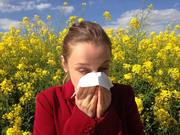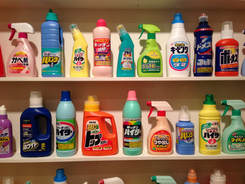What Are Allergies?
An allergy is the body’s over-reaction to normally harmless substances (antigens) in our environment. Dust, pollens, foods, molds, and pets are among the many things that can trigger an allergic reaction. If you are allergic, your immune system treats these antigens as harmful invaders and produces antibodies against them. These antibodies fight against the allergen, causing the allergic reaction.
Common allergy symptoms:
|
|
|
How Do I Know If I Have Allergies?

If you experience any or several of these symptoms regularly, you probably have allergies. If your symptoms worsen at certain times of the year or in certain environments (such as in the presence of an animal), you probably have allergies.
Allergy Testing is used to determine the nature and scope of your allergies.
Allergy Testing is used to determine the nature and scope of your allergies.
Types of Allergies

Seasonal/Pollen Allergies
Seasonal allergies occur in the spring and fall in various climates. Spring allergies start with tree pollens in the early spring and are followed later in the season by grass pollens. Fall allergies are caused by ragweed pollens, which typically emerge in mid to late summer and last through the first hard frost. You may notice a buildup of pollen which is represented by a yellow/green film typically seen on cars and various outdoor surfaces. It may be difficult to spend time outdoors, or participate in outdoor activities if you suffer from seasonal allergies. People who have severe seasonal allergy symptoms often miss work and school.
In addition to the most common allergy symptoms, people who suffer from seasonal allergies may experience the following symptoms:
Seasonal allergies occur in the spring and fall in various climates. Spring allergies start with tree pollens in the early spring and are followed later in the season by grass pollens. Fall allergies are caused by ragweed pollens, which typically emerge in mid to late summer and last through the first hard frost. You may notice a buildup of pollen which is represented by a yellow/green film typically seen on cars and various outdoor surfaces. It may be difficult to spend time outdoors, or participate in outdoor activities if you suffer from seasonal allergies. People who have severe seasonal allergy symptoms often miss work and school.
In addition to the most common allergy symptoms, people who suffer from seasonal allergies may experience the following symptoms:
|
|
|
If you are experiencing mild or intermittent symptoms, environmental controls and medications may be sufficient. If your symptoms are persistent or severe, allergy drops (sublingual allergen immunotherapy) may be right for you.

Pet/Animal Allergies
The most common pet allergies occur upon exposure to dogs or cats. Other animals that can produce the same type of reaction include rabbits, hamsters, horses, gerbils, and birds.
In addition to the most common allergy symptoms, people who suffer from pet/animal allergies may experience the following symptoms:
The most common pet allergies occur upon exposure to dogs or cats. Other animals that can produce the same type of reaction include rabbits, hamsters, horses, gerbils, and birds.
In addition to the most common allergy symptoms, people who suffer from pet/animal allergies may experience the following symptoms:
|
|
|
If you are experiencing mild or intermittent symptoms, environmental controls and medications may be sufficient. If your symptoms are persistent or severe, allergy drops (sublingual allergen immunotherapy) may be right for you.
Dust / Dust Mite Allergies
Dust mites are a common trigger for allergies and allergy symptoms. Dust mites are present even in the cleanest indoor areas. These invisible, microscopic pests are found in home, school and office environments. They thrive in bedding, carpeting, upholstered furniture and soft furnishings.
Many people with dust mite allergy wake up feeling congested and with puffy irritated eyes.
In addition to the most common allergy symptoms, people who suffer from dust/dust mite allergies may experience the following symptoms:
Dust mites are a common trigger for allergies and allergy symptoms. Dust mites are present even in the cleanest indoor areas. These invisible, microscopic pests are found in home, school and office environments. They thrive in bedding, carpeting, upholstered furniture and soft furnishings.
Many people with dust mite allergy wake up feeling congested and with puffy irritated eyes.
In addition to the most common allergy symptoms, people who suffer from dust/dust mite allergies may experience the following symptoms:
|
|
|
Proper control of dust mite allergy requires a combination of environmental controls and medications. If your symptoms are persistent or severe allergy drops (sublingual allergen immunotherapy) may be right for you.
Mold Allergy
Mold allergies are caused by inhaling airborne mold spores. Mold spores are invisible fungal particles which become visible when they reproduce and form clusters. Mold spores are found both indoors and outdoors, but they thrive in damp, poorly ventilated, or dark warm areas. Bathrooms and basements are particularly prone to producing high mold counts and hence increase allergic reactivity. Although mold growth is greatest in high humidity months, mold spores can be present in your home, school or office all year round.
In addition to the most common allergy symptoms, people who suffer from mold allergies experience the following symptoms:
Mold allergies are caused by inhaling airborne mold spores. Mold spores are invisible fungal particles which become visible when they reproduce and form clusters. Mold spores are found both indoors and outdoors, but they thrive in damp, poorly ventilated, or dark warm areas. Bathrooms and basements are particularly prone to producing high mold counts and hence increase allergic reactivity. Although mold growth is greatest in high humidity months, mold spores can be present in your home, school or office all year round.
In addition to the most common allergy symptoms, people who suffer from mold allergies experience the following symptoms:
|
|
|
Proper control of mold allergy requires a combination of environmental control and medication. If your symptoms are persistent or severe allergy drops (sublingual allergen immunotherapy) may be right for you.
Food Allergy
A food allergy is the body’s adverse reaction to the protein component of various foods. Food allergies can manifest in many different ways. Types of reactions can range from mild to severe and life threatening. Food allergies can cause a wide variety of symptoms including nasal, respiratory, skin, gastrointestinal, and in rare instances life threatening anaphylaxis.
These foods account for 90% of all food allergy reactions:
A food allergy is the body’s adverse reaction to the protein component of various foods. Food allergies can manifest in many different ways. Types of reactions can range from mild to severe and life threatening. Food allergies can cause a wide variety of symptoms including nasal, respiratory, skin, gastrointestinal, and in rare instances life threatening anaphylaxis.
These foods account for 90% of all food allergy reactions:
|
|
|
In addition to the most common allergy symptoms, people who suffer from food allergies may experience the following symptoms:
|
|
|
And in the most severe cases, difficulty breathing can progress to a potential life-threatening anaphylactic reaction.
If Food avoidance is not achievable and medications aren’t enough to control your symptoms allergy drops (sublingual allergen immunotherapy) may be right for you.
If Food avoidance is not achievable and medications aren’t enough to control your symptoms allergy drops (sublingual allergen immunotherapy) may be right for you.

Formalin Allergy
Formalin is a formaldehyde derivative which is an ingredient in or a byproduct of many cleaning products, cosmetics, laundry detergents, fabrics, dyes, candles, air fresheners, skin and hair products, glues, carpets, and wood finishes. If you are allergic to formalin, you may be very sensitive to fragrances. You may find increased irritation from cosmetics, body products and cleaning products.
In addition to the most common allergy symptoms, people who suffer from formalin allergies experience the following symptoms:
Formalin is a formaldehyde derivative which is an ingredient in or a byproduct of many cleaning products, cosmetics, laundry detergents, fabrics, dyes, candles, air fresheners, skin and hair products, glues, carpets, and wood finishes. If you are allergic to formalin, you may be very sensitive to fragrances. You may find increased irritation from cosmetics, body products and cleaning products.
In addition to the most common allergy symptoms, people who suffer from formalin allergies experience the following symptoms:
- Sinus Pain / Headaches
- Itchy Skin
- Rashes
- Respiratory Discomfort
- Itchy, Watery Eyes
Formalin allergy is not treated by allergy shots. However, allergy drops (sublingual allergen immunotherapy) can be used to desensitize you to formalin.
Allergy Treatment
There are 3 levels of allergy treatment:
- Avoidance - of the things to which you are allergic
- Medications - such as antihistamines, nose sprays, topical creams and asthma-specific medications
- Immunotherapy - which is the process by which we desensitize the body to the things to which you are allergic (antigens), so that you no longer react to these things when you are exposed to them. The process consists of introducing small amounts of these antigens into the body in gradually increasing doses, thus prompting your immune system to produce antibodies which block the allergic reaction to these substances. Immunotherapy is the only form of allergy therapy that treats the cause of your allergies, not just your symptoms and can permanently decrease your allergic reactivity.
